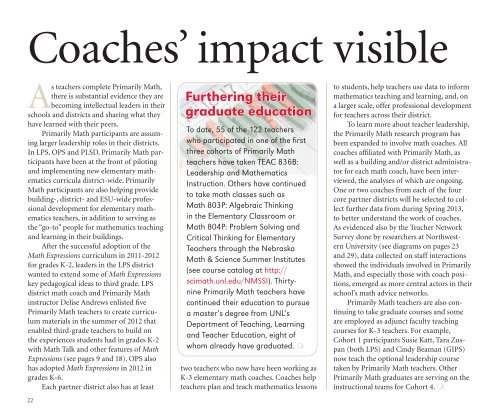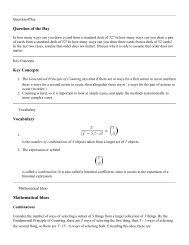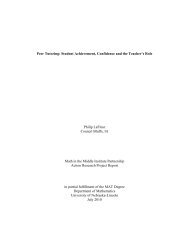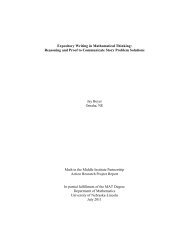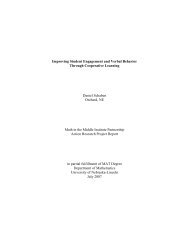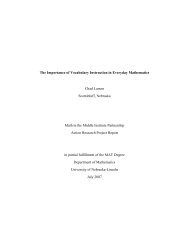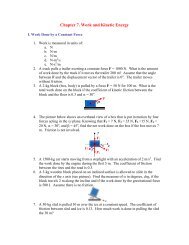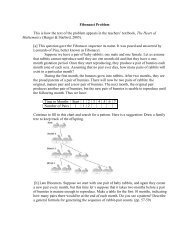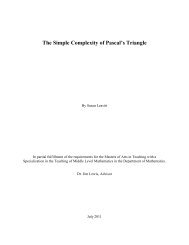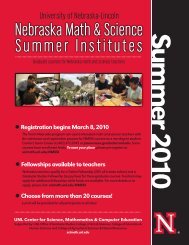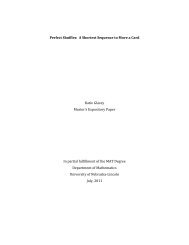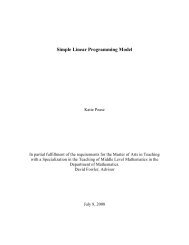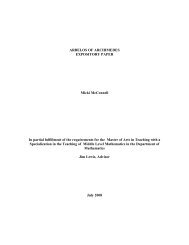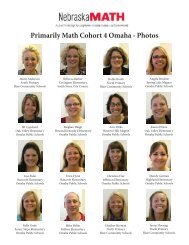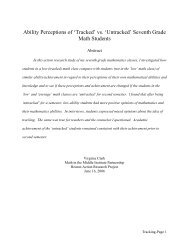Primarily Math - Center for Science, Mathematics & Computer ...
Primarily Math - Center for Science, Mathematics & Computer ...
Primarily Math - Center for Science, Mathematics & Computer ...
Create successful ePaper yourself
Turn your PDF publications into a flip-book with our unique Google optimized e-Paper software.
Coaches’ impact visible<br />
As teachers complete <strong>Primarily</strong> <strong>Math</strong>,<br />
there is substantial evidence they are<br />
becoming intellectual leaders in their<br />
schools and districts and sharing what they<br />
have learned with their peers.<br />
<strong>Primarily</strong> <strong>Math</strong> participants are assuming<br />
larger leadership roles in their districts.<br />
In LPS, OPS and PLSD, <strong>Primarily</strong> <strong>Math</strong> participants<br />
have been at the front of piloting<br />
and implementing new elementary mathematics<br />
curricula district-wide. <strong>Primarily</strong><br />
<strong>Math</strong> participants are also helping provide<br />
building-, district- and ESU-wide professional<br />
development <strong>for</strong> elementary mathematics<br />
teachers, in addition to serving as<br />
the “go-to” people <strong>for</strong> mathematics teaching<br />
and learning in their buildings.<br />
After the successful adoption of the<br />
<strong>Math</strong> Expressions curriculum in 2011-2012<br />
<strong>for</strong> grades K-2, leaders in the LPS district<br />
wanted to extend some of <strong>Math</strong> Expressions<br />
key pedagogical ideas to third grade. LPS<br />
district math coach and <strong>Primarily</strong> <strong>Math</strong><br />
instructor Delise Andrews enlisted five<br />
<strong>Primarily</strong> <strong>Math</strong> teachers to create curriculum<br />
materials in the summer of 2012 that<br />
enabled third-grade teachers to build on<br />
the experiences students had in grades K-2<br />
with <strong>Math</strong> Talk and other features of <strong>Math</strong><br />
Expressions (see pages 9 and 18). OPS also<br />
has adopted <strong>Math</strong> Expressions in 2012 in<br />
grades K-6.<br />
Each partner district also has at least<br />
22<br />
Furthering their<br />
graduate education<br />
To date, 55 of the 122 teachers<br />
who participated in one of the fi rst<br />
three cohorts of <strong>Primarily</strong> <strong>Math</strong><br />
teachers have taken TEAC 836B:<br />
Leadership and <strong>Math</strong>ematics<br />
Instruction. Others have continued<br />
to take math classes such as<br />
<strong>Math</strong> 803P: Algebraic Thinking<br />
in the Elementary Classroom or<br />
<strong>Math</strong> 804P: Problem Solving and<br />
Critical Thinking <strong>for</strong> Elementary<br />
Teachers through the Nebraska<br />
<strong>Math</strong> & <strong>Science</strong> Summer Institutes<br />
(see course catalog at http://<br />
scimath.unl.edu/NMSSI). Thirtynine<br />
<strong>Primarily</strong> <strong>Math</strong> teachers have<br />
continued their education to pursue<br />
a master’s degree from UNL’s<br />
Department of Teaching, Learning<br />
and Teacher Education, eight of<br />
whom already have graduated. <br />
two teachers who now have been working as<br />
K-3 elementary math coaches. Coaches help<br />
teachers plan and teach mathematics lessons<br />
to students, help teachers use data to in<strong>for</strong>m<br />
mathematics teaching and learning, and, on<br />
a larger scale, offer professional development<br />
<strong>for</strong> teachers across their district.<br />
To learn more about teacher leadership,<br />
the <strong>Primarily</strong> <strong>Math</strong> research program has<br />
been expanded to involve math coaches. All<br />
coaches affiliated with <strong>Primarily</strong> <strong>Math</strong>, as<br />
well as a building and/or district administrator<br />
<strong>for</strong> each math coach, have been interviewed,<br />
the analyses of which are ongoing.<br />
One or two coaches from each of the four<br />
core partner districts will be selected to collect<br />
further data from during Spring 2013,<br />
to better understand the work of coaches.<br />
As evidenced also by the Teacher Network<br />
Survey done by researchers at Northwestern<br />
University (see diagrams on pages 23<br />
and 29), data collected on staff interactions<br />
showed the individuals involved in <strong>Primarily</strong><br />
<strong>Math</strong>, and especially those with coach positions,<br />
emerged as more central actors in their<br />
school’s math advice networks.<br />
<strong>Primarily</strong> <strong>Math</strong> teachers are also continuing<br />
to take graduate courses and some<br />
are employed as adjunct faculty teaching<br />
courses <strong>for</strong> K-3 teachers. For example,<br />
Cohort 1 participants Susie Katt, Tara Zuspan<br />
(both LPS) and Cindy Beaman (GIPS)<br />
now teach the optional leadership course<br />
taken by <strong>Primarily</strong> <strong>Math</strong> teachers. Other<br />
<strong>Primarily</strong> <strong>Math</strong> graduates are serving on the<br />
instructional teams <strong>for</strong> Cohort 4.


